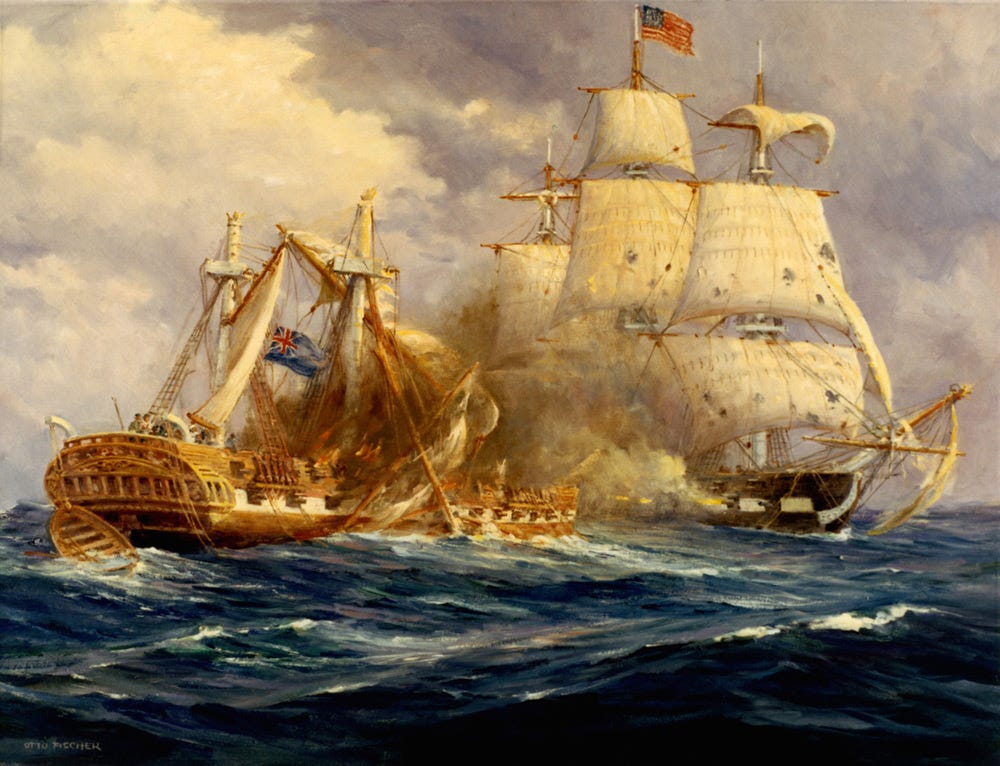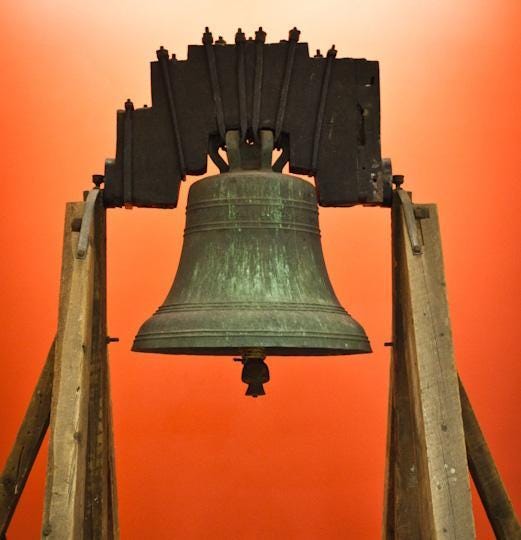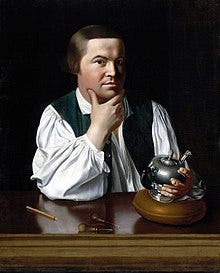Paul Revere in the Story of History
If we know about Paul Revere, most of us remember him for his famous midnight ride, to warn the Massachusetts militia that "the British are coming," which sparked the first battle of the American Revolution.
But the story as usually told omits even much of that night - such as how Revere was captured by the British midway through that ride, how it was completed by another rider who'd been sent along with him, and how Revere talked his way out of captivity by lying to the British that a large body of militiamen was about to attack them.
And that was just one night.
Even more significantly, the story omits the rest of Revere's life. You might've heard a sidenote that he was a silversmith. (That's all I'd heard myself last year.) But I recently read a very interesting biography of him - Midnight Ride, Industrial Dawn, by Robert Martello - which both tells a fascinating story and raises some interesting points about Revere's life as lived inside the larger story of history.
Paul Revere did start out as a silversmith, apprenticing to his father and then inheriting his father's shop when he died in 1754 during Paul's young adulthood. Silversmiths made works of art such as decorated teapots and candlesticks as well as simpler goods like buttons and more useful things like tableware or false teeth. At the start of his career, Paul Revere would take just about any commission he could get across the range of silver goods. As skilled artisans, silversmiths were considered socially above most other sorts of worker. These social considerations were less significant in the colonies than in Europe - but they were still quite significant.
Like many Founding Fathers, Paul Revere was seized with ambition to better his circumstances and make a name for himself. He volunteered for the militia in the French and Indian War (1756), and then dived into the nascent Patriot movement, becoming a leader in the Sons of Liberty in Boston. As a trusted and competent leader, he was repeatedly chosen as their messenger and representative to other towns and cities. It was this experience that made him a logical choice for one of the messengers to Lexington and Concord on his famous midnight ride (18-19 April, 1775). Several other messengers were chosen to go by other routes - which turned out to be a good thing, since Revere himself (as I mentioned at top) was captured halfway there.
During the Revolution, he repeatedly lobbied for a military commission, and instead was repeatedly named as a military engineer to study fortifications and expand gunpowder production. Finally, after many tries, he got his wish and was chosen to command the artillery in the Penobscot Expedition. But the expedition failed, and Revere's military career ended in disgrace. After the war, he repeatedly sought public office and tried to reinvent himself as a merchant importing and reselling customer goods from Europe, but both efforts failed.
But while unsuccessfully trying to be a merchant, Revere was also changing his smithing. He simplified his silver smithy by introducing more machinery and focusing on mechanizable products like tableware, rather than more artistic pieces like candlesticks. He was one of the first silversmiths in America to change his focus like this. This meant he wasn't personally needed in the silversmithy anymore, and could spend his time and the money he got from the shop on other activities.
With this time and money, he started venturing into iron and bronze casting. He knew chemistry and metalworking well from his time as a silversmith, and he was ready to extend his knowledge to new challenges. By the late 1780's, he was regularly selling iron goods. In 1792, he made the first ever churchbell cast in America (still hanging in Boston's North Church today). Churchbells would be a major product for the rest of his life, as well as other iron and bronze goods from bolts to cannons.
But even more significantly, in 1794, Revere started the first large-scale copper mill in America. Several years later (from 1798-1800), he developed by trial and error how to make consistent-quality rolled copper. Rolled copper sheets were a recent discovery in Britain, where they were used to protect the bottoms of warships, and the whole rolling process was guarded as a national secret. Revere figured it out himself by trial and error.1 When he first wrote the Secretary of the Navy offering to produce copper sheets for American naval ships, the Secretary literally couldn't believe he could do it. But Revere (unlike anyone else in America) could, and by 1800, he had produced enough copper that he did get a Navy contract. This gave America secure domestic copper production during the British blockade in the War of 1812, as well as an invaluable stepping-stone for future technological advancement - for example, Revere built the engines for Fulton's first-ever steamboats.
Revere handed down his business to his very competent son Joseph Warren Revere, having grown it from an artisanal shop to an early industrial factory. The Revere Copper Company is still in existence today, advertising (quite accurately) its "unparalleled history of copper excellence." Revere was far more significant to America's story there than he had been in his famous midnight ride.
While I was reading this book, I was amazed again at how history is fractally deep. However deep you go, there's always more. I hadn't appreciated the difficulties of coppersmithing and the early industrial development of America; I hadn't known anything about copperplating ships. This was a whole new chapter of the American story to me.
And, it was new to Revere too as he embarked on it. He didn't know any of this either until late in life; until in the 1790's (when he was in his 60's), he was stubbornly trying to raise his social status through becoming a merchant or statesman. Finally, he found an alternative as an industrial pioneer, a category familiar to us but new to him. The real wonder I took from reading Revere's story is that it doesn't just reveal to us a chapter of American history, but it tells us that story as we watch Revere - a famed Patriot hero - discover that story himself and find the part he could best play in it.
Revere's midnight ride was just one night. He lived beyond then - which is obvious when it's stated clearly like this, but we can often forget it. Before reading this biography, I'd known virtually nothing about Revere's life, but he did have his own story which intertwined with America's larger story much more closely and dramatically than I had imagined.
Revere ended up not just raising himself up on the social ladder, but stepping outside that ladder. In this (as Martello the biographer mentions, quite correctly) he can symbolize the larger American story. And also, he can symbolize the story of the Industrial Revolution, where new industry and factories break down old entrenched social hierarchies - from factory owners breaking the English aristocrats' monopoly of "old money" to the industrially-fueled armies of Revolutionary France literally destroying aristocrats throughout half of Europe.
Revere himself didn't approve of many of the social changes that happened around him.
It wasn't that he opposed changes. The political changes, he energetically pushed forward as a leader of the Sons of Liberty. The economic changes, he joined in. He pioneered mechanization of the smithing process, and reformulated his silversmithing shop to focus on more mass-produced items that could be made by machines and a smaller amount of lower-skilled labor.
But the social changes were another matter. Revere was a staunch Federalist, distrustful of the French Revolution and excesses of democracy. He'd spent decades trying to advance up the old ladders rather than trying to bring them down. And, he kept some remnants of the old apprenticeship system at his factories, such as individually negotiating his employees' hours and pay rather than imposing one-size-fits-all wage rates. He didn't write much about these social changes in general - at least, not that survived. Most personal papers he wrote have been lost; what we have are mostly his business papers, which barely mention any politics that don't affect his business.2
And, these social changes did take time. Throughout the first decades of the 1800's, even the Post Office was besieged with applicants for postmasterships that paid next to nothing, because of the honor of being a government employee. The Postmaster General was viewed as one of the most politically powerful people in America, because of this patronage. Even late in his life, Revere's earlier questing for a government position would have remained perfectly understandable.
But after that long and fruitless quest, he turned to pioneering iron and copper working. Revere's story was broader than he might have acknowledged - and it became a story that, later on, could have been taken as a microcosm and prototypical symbol of American life.
Revere himself had no idea where his story would go at the time he was living it out, and he had totally the wrong idea what part he'd play in America's story. He kept pressing for a life of public service, in local government or the military, on the one hand positioning himself as a leader of the city's artisans while on the other hand calling himself a merchant or militia officer or any title that gave him more cachet. If he'd had his way, his midnight ride would've led to regular service with the Continental Army and then a political career after the war - perhaps in the legislature, or perhaps in the federal Treasury.
But the United States already had people to do that. It didn't have enough people with Revere's unique talents. During the war, the Massachusetts state government and Continental Congress responded to Revere's repeated petitions for a commission by repeatedly sending him to investigate gunpowder production - something the Revolution needed a lot more than one more officer. After the war, Revere's coppersmithing was for a while totally unique in America, with methods so far ahead of any other American smith that the Secretary of the Navy literally couldn't believe it when Revere first offered to copperplate the hulls of American ships.

All of this gave Revere a much bigger and more significant place in America's story than he could have hoped for. Perhaps he didn't have as much social status as he'd been trying for - but he gave much more service to his country.
But still, all of this is largely forgotten. We remember Revere only for the one midnight ride, and we forget the much greater part he played in America's story. Why is this?
Revere and his contemporaries considered political service more socially honorable and prestigious. He and many of the other Founding Fathers sought political and military offices both to gain social status in their lifetimes, and - quite consciously, in some cases - to be remembered by future historians. We in the modern day disagree about social status, but I have to say that political service generally is more memorable in our common simplified telling of history. Political leaders like Washington, Franklin, Jefferson, Jackson, Webster, Clay, and Lincoln get in the history books in places that inventors like Fulton or religious leaders like Cartwright don't. Inventions like steamships or railroads often appear without the story of their invention (or their development or logistics). So because of this, when Revere was hunting for military or political glory, he was looking in exactly the right place that would have gotten his name in the history books. And indeed, it is in the history books because of his one moment of glory connected with the Revolution.
But beyond that, even though Revere's copper production was vital, it doesn't stand out and get noticed. He independently figured out how to produce consistent-quality copper at scale, and copper sheathing, but he wasn't the first to do that. What's more, copper plating of naval vessels - however invaluable - isn't the sort of thing that's inherently interesting to people who don't know about warships of that era. It's a vital part of the story of history, but it can easily be overlooked.
And even beyond that, it can be lost in the arc of the transition into the industrial era. As I've said earlier, transitions in history take time. Moving America into the industrial era - building factories in America, and building American churchbells and cannons and an American Navy from American materials with American production - took time, effort, and people like Revere. But all of this is very complex, and usually gets simplified out of how we tell history.
That transition didn't have to happen. It wasn't inevitable that the United States became an industrial power. It could have been aborted, like it was in the antebellum United States South, or in South America. If the United States didn't have people like Revere, its industrial potential would've stayed a footnote in history, with lovers of history digging into the fractal footnotes and details of what had almost started to happen. But instead, we did have Revere, and so the United States did have copper production for its Navy and for more future development.
Paul Revere knew he wanted to be significant in America, and he was, though in a completely different way from how he'd expected. The story of America was broader than he knew, and broader than it's often told in the modern day.
This should simultaneously inspire us in our own lives, and help keep us humble. We know that everyone in history has their own story. Often, we don't know their stories. But people like Revere who are far more significant than we thought should remind us that those unknown stories can be quite significant. If Revere did these vital things that were recorded but hardly remembered - and if his employees, who are only recorded to us as names and employment contracts in Revere's papers, were invaluable in it - who else could have been significant in the story of history in ways we don't know? Whether or not we know their stories, they did happen.
Also, perhaps we're just as ignorant about what will prove significant to future generations as Revere was while trying to be a military officer or merchant. Certainly, many other people throughout history have been just as misguided - for example, many of the Founding Fathers were predicting that Westward expansion would still be continuing up "to the hundredth and thousandth generation" (as Jefferson put it). Who knows what future generations will be saying about us?
By the time Paul Revere sent his son Joseph Warren Revere to tour Europe in 1804 as an industrial spy, he was already consistently producing good rolled copper. Despite all British refineries' efforts to keep their designs secret, Joseph Warren Revere took home many invaluable designs and methodologies - but they were just used to further improve an already working process.
We do have one letter to Revere from a friend who'd recently purchased slaves, essentially asking Revere to please stop nagging him about the slaves’ desires and their rights. This is the only way we know Revere's opinions on slavery or race - so we can only imagine what he'd orally said on other political matters.






